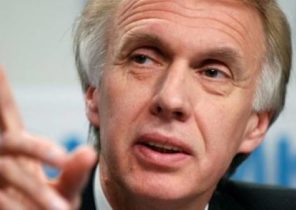
In Brussels launched negotiations on Brexia, which proved to be very difficult. British and European representatives could not agree more than half of the items on the agenda. From the outset it became obvious that the UK is in an extremely disadvantageous negotiating position: weakened by the recent parliamentary elections, the government Theresa may couldn’t even formulate the concept of Breccia — whether “soft” or “hard”.
Meanwhile, multiply the signals that Breaksit will be London genuine economic disaster: the country is already gone (or preparing to leave), major banks, airlines, international organizations, rolled up a joint with the EU programme in the aerospace and nuclear fields. Fell investment attractiveness of the UK, has weakened the pound, and even property prices in London began to creep down. Many observers believe that the country will face a test as have not been since the days of Dunkirk (the defeat in 1940).
So why is the British political establishment (both conservative and labour) continues to support Brakcet? They claim that it is the will of the British people. But this is nothing more than an excuse. The ruling class of Britain has always ignored the people’s opinion, if it did not match his interests. The results of the non-binding referendum in 2016 is well known: 48% of voters voted for continued membership in the EU, 52% yield.
For Pexit voted “yesterday” Britain: pensioners, farmers, fishermen, traditional working class province. For the EU — young people, IT-specialists, representatives of liberal professions, the financial sector, and everything to do with globalization. But “yesterday” England (Scotland was in the EU) became the main argument (but not the reason for) the divorce process with Europe. Stop Brakcet was technically difficult — through the decision of the Parliament, through a second referendum, through the veto Queen. However, nobody did.
The British political elite has not changed position on Brexia, the differences relate only to the formula of divorce — “hard” or “soft”. So what has caused such a rare unanimity in the British political class? Why London decided to go on a great economic and geopolitical risk? German and French analysts see the following reasons (not always announced), have pushed the British elite on Brakcet: 1. The “German factor”. The United Germany has become too powerful and dominates in the EU, not only economically but also politically. When Britain joined the EEC in the early 70-ies of the last century, in Western Europe there was a balance of three countries — France, Germany and the UK, where each of the partners had comparable weight. However, after the reunification of Germany in 1989, this balance was disturbed. UK very hard perceived growing dominance of Germany, which is incompatible with the Imperial pride of the British and the country’s role in the world.
2. The collapse of the Soviet Union. The presence of a powerful and threatening to the West of the Soviet Union was a major factor in cementing Western unity. After the disappearance of the Soviet Union and “Eastern bloc” geopolitical realities have changed dramatically. The increased role of the United Germany, while the role of Britain and France in the enlarged EU dropped sharply.
3. The transformation of the EEC into the European Union. In 1992 at the initiative of Germany and France (in the person of Helmut Kohl and Francois Mitterrand) “Common market” was turned into the European Union, the economic community became a political, which, naturally, did not like the British elite. With the deepening of European integration, Brussels has become the political capital of the European Union, a bureaucratic monster that dictates their laws and policies — from trade to human rights to the size of cucumbers and volume of fish catch. But if Germany, France and Italy due to historical traditions (all of them were included not only in the Western Roman Empire, but the Empire of Charles the Great) was ready for deeper integration, the island England has never considered himself part of continental Europe and did not accept the diktat of Brussels.
4. EU enlargement to the East and South. With the admission of countries from Eastern and southern Europe, the EU has lost its “Western” civilizational in nature. Poor, prone to corruption and violations of human rights “mladoevropeytsy” turned noble Western club in similarity of the Soviet Union, became a source of financial and political instability. Moreover, millions of Eastern European migrant workers flooded into the UK, depriving the work of an ordinary Britons employed in low-skilled labor.
5. The global financial crisis of 2007-2008, the bankruptcy of Greece and the upcoming Italian bankruptcy also increased mistrust of the British elites to the European project. They don’t want to be in a community of troubled countries.
6. Migration of the 2015 crisis gave a strong impetus to the supporters of Breccia. The hasty decision of Angela Merkel to start in Europe, millions of migrants from the Middle East and Africa was the beginning of an irreversible migration processes that threaten to overwhelm the “old continent”. The migrants, mostly Muslims, brought with them new security threats. In this respect England has decided to dissociate itself and its policy in the field of migration and security.
7. The future of the British offshore. UK — the owner of the world’s major offshore companies, however, in recent years more and more clearly traced intention of the European financial authorities to control the uncontrollable capital flight in the British offshore institutions that are not subject to the jurisdiction of Brussels. For post-industrial England, the offshore — one of the main sources of wealth, and from this exclusive “feeders” London will never give up.
8. The crucial point of identity, of national pride-the British revived the old Imperial reflexes. Britain likes to see itself the center of the English-speaking world and the leader of the British Commonwealth of Nations, rather than “one of equals” in the EU. Problems India, Hong Kong or Australia is much closer to the heart of the British than of the economic and social turmoil of continental Europe.
9. And, finally, distrust of the British political elite in the future of the European project. We can say that the British ran first with Eurocorps, which is still not sunk, but only fights with the elements. However, the conceptual failure of the European Commission and leading EU countries to develop an exit strategy from the crisis for the British elite are already evident.
Thus, the decision on Brexia (with all the associated risks) was neither accidental nor disposable. It corresponds to the whole logic of the thinking of the British ruling class and comes from the new geopolitical situation in the world. In London believe that after a hard transitional period, a new modus vivendi for the UK will inevitably be found, while the problems of the European Union will accumulate and worsen. This will give the response time.







